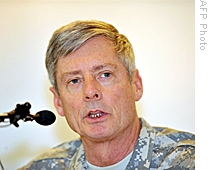Washington
19 March 2009
Senior U.S. military officers said Thursday that if North Korea's planned satellite launch succeeds next month, it would represent a significant threat to global security and would increase the liklihood that the communist country will sell advanced military technology to other rogue states.
 |
| Army General Walter Sharp |
"The threat is real and it is felt in South Korea, the threat of having the capability of being able to deliver any sort of warhead anywhere in the world is indeed a threat. And we call on North Korea not to do this provocation, but instead go back and focus on what they promised to do during the Six-Party Talks," he said.
North Korea has already tested a nuclear weapon. But officials say even if the country conducts a successful rocket or long-range missile launch next month, it probably does not have a nuclear warhead it could put atop such a vehicle.
General Sharp says North Korea is disabling its nuclear program, as promised. But he added that any rocket or missile launch would violate a United Nations Security Council resolution. Sharp says North Korean leader Kim Jong Il has other interests, besides defying the U.N. and demonstrating the threat he can pose.
The general says a successful launch would help Mr. Kim demonstrate he is in control, strengthen his grip on power in the wake of his illness last year, possibly force concessions from the international community, and improve his chances of selling missile and weapons technology to other countries.
"His ability to be able to launch a ballistic missile and demonstrate he has that capability goes a long way on the road of helping him proliferate that to other countries around the world, and to be able to get cash back in order to go, again, back into regime survival."
The announced launch would demonstrate a long-range attack capability for North Korea. But General Sharp notes that the country also maintains the ability to inflict severe damage on its neighbor, South Korea. The general says the United States and its allies would defeat any such attack, and would overthrow the Pyongyang government in the process.
That led the Chairman of the Senate Armed Services Committee, Carl Levin, to conclude that North Korea would likely not launch such an attack because its government's main goal appears to be to stay in power.
At the same hearing, the commander of all U.S. forces in the Pacific region, Navy Admiral Timothy Keating, said the United States has the ability to shoot down a North Korean Tai Po Dong missile if it threatens U.S. territory. He also said the United States is not alone in its view of North Korea, among the 38 countries in his area of responsibility.
"I would think it would be fair to characterize North Korea as the largest day-to-day concern in the eyes of most of the countries in our region. And it is not just because of potential Tae Po Dong activity. Their leadership is perhaps characterized as erratic. The succession is not clear. What happens next is not clear. Their day-to-day activities are unpredictable and can be very confrontational. So their policies are the most unsettling of any in the region," he said.
And U.S. officials expect that to continue. General Sharp says Kim Jong Il has made clear that he will fund his military program, even if it means worsening shortages of food and other vital supplies for his people.